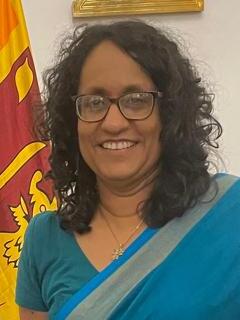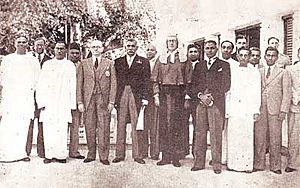Prime Minister of Sri Lanka facts for kids
Quick facts for kids Prime Minister of Sri Lanka |
|
|---|---|

|
|

Emblem of Sri Lanka
|
|
| Style |
|
| Member of |
|
| Reports to | |
| Residence | Temple Trees |
| Appointer | President of Sri Lanka |
| Term length | At the pleasure of the president
|
| Constituting instrument | Constitution of the Democratic Socialist Republic of Sri Lanka |
| Precursor | Chief Secretary of Ceylon |
| Inaugural holder | Don Stephen Senanayake |
| Formation | 14 October 1947 |
| Succession | First |
The prime minister of Sri Lanka is a very important leader in the country. This person is the most senior member of parliament in the cabinet of ministers. The cabinet is a group of top government officials.
The prime minister's job is the second most powerful in Sri Lanka's government. The president holds the most power. The cabinet, including the prime minister, works together. They are responsible to the parliament for their decisions. The role of the prime minister has changed many times since 1947.
Harini Amarasuriya is the current prime minister of Sri Lanka. She became the 16th prime minister on September 24, 2024.
Contents
How the Prime Minister Is Chosen
Appointing the Prime Minister
The president chooses a member of parliament to be the prime minister. The president picks the person they believe will have the most support from the Parliament.
The prime minister stays in office as long as the cabinet of ministers is working. They can also stay unless they resign or stop being a member of parliament.
What the Prime Minister Does
Powers and Responsibilities
The role of prime minister was created in 1947. Back then, Sri Lanka was called Ceylon. The prime minister was the main leader of the government. This was part of the Westminster system, a way of governing.
In 1978, big changes happened. Many of the prime minister's powers moved to the president. The president became both the head of state and the head of government. This meant the prime minister became a senior member of the cabinet. They also became the person who would take over if something happened to the president.
If the president and prime minister are from the same political party, the prime minister acts as the president's deputy. Sometimes, the president and prime minister are from different parties. This can happen if a "national government" is formed. In these cases, the prime minister acts as the main leader of the government.
In 2015, some powers were given back to the prime minister. This made the role more powerful again.
Important Roles and Councils
The prime minister is second in importance after the president. They are a member of the constitutional council. They also belong to the national security council. The prime minister is the most senior member of the cabinet of ministers.
Advising the President
The prime minister has the power to advise the president on important matters. These include:
- Choosing, removing, or accepting resignations of ministers.
- Changing the jobs or areas of responsibility for cabinet ministers.
Taking Over as President
If the president's office becomes empty, the prime minister steps in. They act as president until a new president is chosen. During this time, the prime minister appoints another minister to act as prime minister.
If the prime minister's office is also empty, or if the prime minister cannot act, the Speaker of the Parliament takes over as acting president.
The president can also ask the prime minister to take over their duties temporarily. This happens if the president is sick, out of Sri Lanka, or unable to do their job for any other reason.
Prime Minister's Perks
Official Homes and Offices
The prime minister's official home is called the Prime Minister's House. It is usually known as Temple Trees. The prime minister also has a vacation home. It is called the Prime Minister's Lodge in the town of Nuwara Eliya.
The main office for the prime minister is the Prime Minister's Office. It is located in the Sirimathipaya in Colombo.
Sometimes, presidents have used Temple Trees as their home. Some prime ministers have chosen to live in their own homes instead.
Travel Arrangements
For travel on the ground, the prime minister uses a special car. It is an armored black Mercedes-Benz S-Class Pullman Guard. For air travel within Sri Lanka, helicopters from the No. 4 (VVIP/VIP) Helicopter Squadron are used. For longer trips, they use regular flights from SriLankan Airlines.
Security for the Prime Minister
The Sri Lanka Police traditionally protect the prime minister. In the past, a single police officer was assigned for protection. After an assassination attempt on a prime minister, security was increased.
Today, the Prime Minister's Security Division is in charge of keeping the prime minister safe.
Order of Importance
In Sri Lanka, the prime minister is ranked after the president. However, they are ranked before the Speaker of the Parliament. This shows their important place in the government.
History of the Prime Minister's Role
The job of Prime Minister of Ceylon started in 1947. This happened when Ceylon gained self-rule. D. S. Senanayake became the first Prime Minister. He was the leader of the United National Party. The prime minister also managed foreign affairs and defense.
In 1972, Ceylon became a republic and was renamed Sri Lanka. The prime minister was the head of government. This made it the most powerful political job. But in 1978, the president became the head of both state and government. This changed the prime minister's role.
If the president's office becomes empty, the prime minister becomes the acting president. This happens until a new president is chosen. This occurred with President Dingiri Banda Wijetunge.
Ranil Wickremesinghe has been prime minister six times. Dudley Senanayake served four times. Sirimavo Bandaranaike was prime minister three times. In 2015, a new law gave the prime minister more power. This included more say in appointing ministers.
Political Challenges in 2018
In October 2018, Mahinda Rajapaksa was appointed prime minister. This happened when President Maithripala Sirisena removed Ranil Wickremesinghe. Wickremesinghe said this was against the law. This led to a constitutional crisis.
A court stopped Mahinda Rajapaksa from working as prime minister in December 2018. Soon after, Ranil Wickremesinghe was re-appointed. This ended the crisis.
Economic and Political Issues in 2022
In March 2022, people protested against the government. They were upset about the country's economic crisis. This was the worst economic problem since Sri Lanka became independent. Many blamed the Rajapaksa family for the issues.
On May 9, 2022, Prime Minister Mahinda Rajapaksa resigned. Three days later, Ranil Wickremesinghe became prime minister.
On July 9, 2022, protesters entered government buildings. They also set fire to Prime Minister Ranil Wickremesinghe's home. This led to President Gotabaya Rajapaksa leaving Sri Lanka. Wickremesinghe became acting president. Rajapaksa officially resigned a day later.
On July 20, Ranil Wickremesinghe was elected President by Parliament. Two days later, Dinesh Gunawardena was appointed Prime Minister.
See also
 In Spanish: Primer ministro de Sri Lanka para niños
In Spanish: Primer ministro de Sri Lanka para niños
- List of prime ministers of Sri Lanka
 | DeHart Hubbard |
 | Wilma Rudolph |
 | Jesse Owens |
 | Jackie Joyner-Kersee |
 | Major Taylor |



